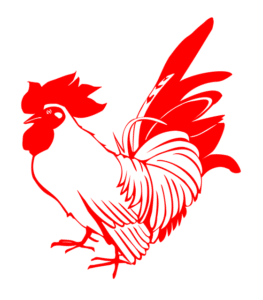20 Chinese Idioms That Contain
The Word ‘Chicken’
January 30, 2017
The use of Chinese idioms is common in daily conversations in China for people of all ages. It is recorded that there are 20,000 Chinese idioms in China, of which 4,000 are frequently used. If you have 40 Chinese lessons in a year, that means you need to learn 100 idioms in each lesson to cover the frequently used idioms (or just 20 idioms each lesson if your Chinese language course spans five years). Some dictionaries even record up to 50,000 idioms in total! Therefore, if you learn Chinese, it is important for you to be familiar with some most commonly used idioms.
As 2017 is the Year of the Rooster, let’s learn some Chinese idioms that contain the word ‘chicken’ or 鸡 (jī).

1. 独鹤鸡群 (dú hè jī qún)
独鹤 means ‘a single crane’; 鸡群 means ‘a flock of chickens’.
This idiom is a metaphor of a person’s ability that surpasses the crowd.
2. 割鸡焉用牛刀 (gē jī yān yòng niú dāo)
Literally, it means ‘why use a cleaver to kill a chicken’.
This idiom is a metaphor that a person should not exert a huge effort for a small matter.
3. 鹤发鸡皮 (hè fà jī pí)
鹤发 means ‘grey hair’; 鸡皮 means ‘wrinkled skin’.
This idiom is used to describe an elderly person’s appearance.
4. 鸡虫得失 (jī chóng dé shī)
This idiom means insignificant gains and losses.
5. 鸡蛋里找骨头 (jī dàn li zhǎo gǔ tou)
Literally, it means ‘looking for bones in an egg’.
This idiom is a metaphor of being deliberately critical.
6. 鸡飞蛋打 (jī fēi dàn dǎ)
Literally, it means ‘the chicken has flown away and the eggs are broken’.
This idiom is a metaphor of a lose-lose situation.
7. 鸡犬之声相闻,老死不相往来 (jī quǎn zhī shēng xiāng wén, lǎo sǐ bù xiāng wǎng lái)
It refers to people who have broken contact with each other although they live near each other. Hence, the literal translation: ‘[each] can hear the sound of chicken and dog, [but] not in contact until death’.
This idiom is now used to describe people who mutually do not understand each other and do not communicate with each other.
8. 捉鸡骂狗 (zhuō jī mà gǒu)
Literally, it means ‘catching the chicken, scolding the dog’.
This idiom is a metaphor of somebody appearing to scold somebody, but actually they mean it for somebody else.
9. 宰鸡教猴 (zǎi jī jiào hóu)
Literally, it means ‘slaughtering the chicken, teaching the monkey’.
This idiom is a metaphor of severely punishing one person to warn the rest.
10. 一人得道,鸡犬升天 (yī rén dé dào, jī quǎn sheng tiān)
Literally, it means ‘one person is enlightened, chickens and dogs ascend to heaven’.
This idiom is a metaphor of irony describing one person gaining power and the rest of his followers enjoying the fortune.
11. 鼠肚鸡肠 (shǔ dù jī cháng)
鼠肚 means ‘a rat’s stomach; 鸡肠 means ‘a chicken’s intestine’.
This idiom is a metaphor of not seeing the big picture, only being concerned about trivial matters.
12. 杀鸡取蛋 (shā jī qǔ dàn)
Literally, it means ‘killing the chicken to get the eggs’.
This idiom is a metaphor of favouring small gains due to greed, yet ruining long-term benefits.
13. 嫁鸡逐鸡 (jià jī zhú jī)
Literally, it means ‘marrying a chicken, chasing the chicken’.
This idiom is a metaphor of women, after getting married, can only obey their husbands.
14. 鸡飞狗跳 (jī fēi gǒu tiào)
Literally, it means ‘flying chicken, jumping dog’.
This idiom is used to describe panic resulting in a mess.
15. 鸡肠狗肚 (jī cháng gǒu dù)
鸡肠 means ‘a chicken’s intestine’; 狗肚 means ‘a dog’s stomach’.
This idiom is a metaphor of narrow-mindedness and a vicious heart.
16. 呆若木鸡 (dāi ruò mù jī)
Literally, it means ‘dumb like a wooden chicken’.
This idiom is used to describe being stupefied due to fear or shock.
17. 鸡口牛后 (jī kǒu niú hòu)
Literally, it means ‘[prefer to be a small and clean] chicken’s mouth, [rather than a big and filthy] cow’s rear’.
This idiom is a metaphor of preferring to have one’s autonomy in a small place, rather than being in a big place yet ruled by others.
18. 鸡烂嘴巴硬 (jī làn zuǐ ba yìng)
鸡烂 means ‘rotten chicken’; 嘴巴硬 means ‘a hard mouth’.
This idiom is a metaphor of insisting on one’s flawed reasoning.
19. 鸡犬不留 (jī quǎn bù liú)
This idiom describes a brutal massacre, even the animals are not spared.
20. 木鸡养到 (mù jī yǎng dào)
This idiom describes a skill that has reached excellence.
GROUP AND PRIVATE
MANDARIN CLASS

